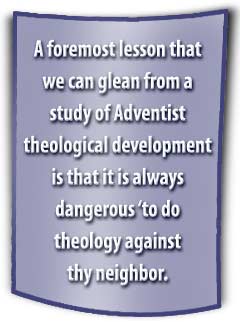
have always liked the legend of the blind men and the elephant, put to verse by John Godfrey Saxe (1816-1887). The legend has reportedly been traced from the Han dynasty in China to India, and has even been found in Africa.
It is about blind men who investigate an elephant, each approaching it at a different place, and each coming up with fact-based ideas of what it is like—a fan, a rope, a spear, a tree, a wall. Saxe’s poetic version ends with this insightful verse:
“So oft in theologic wars,
The disputants, I ween,
Rail on in utter ignorance
Of what each other mean,
And prate about an Elephant
Not one of them has seen!”
In the past half century this church has faced some differences of theological opinion. Some of those deeply involved in “sorting us out” dispute with one another. Perhaps absolute truth is like the elephant. It does exist. It is not something relative to each blind man’s experience. But like the blind men, no one of us knows all of it, or even completely understands the part we do know.
Saxe’s verse does not describe the disputants as ignorant in what they know of the elephant. The ignorance he describes is “of what each other mean.” Those who study the big truths about God are far from ignorant. They are, instead, often too smart in building the case for their portion of the elephant.

George Knight has described this phenomenon well. “A foremost lesson that we can glean from a study of Adventist theological development is that it is always dangerous ‘to do theology against thy neighbor.’”
1 He states that a major cause of our disputes and theological skirmishes is that in an effort “to escape from one sort of perceived error, people often back into the opposite viewpoint. . . . Individuals consciously or unconsciously place a
primary emphasis on putting distance between themselves and what they consider to be error and . . . conclude that they can learn nothing of value from those who differ from them.”
2
When discussing how this type of “theology making” can be avoided, Knight refers to A. Leroy Moore’s term “paradoxical thinking.”3 This type of thinking is open to all sides of a truth. Not in order to mix truth and error, but to unite the various parts of the “truth elephant” in order to get a more complete picture.
From elephants, let’s go to the modern science of Global Positioning System (GPS) technology to help explain how applying paradoxical thinking to our methods of “doing theology” could work.
GPS works because of many satellites positioned around the world. A receiver on earth times signals between itself and a minimum of three satellites at a time in order to pinpoint two possible locations at which it could be. Then one position is thrown out because it is usually not logical. However, even with imperfect receivers, one accurate position can be ascertained by taking a fourth measurement. With this fourth-measurement “correction process even the lowliest GPS receiver turns into an atomic-accuracy clock.”4
I am not implying that a multitude of different “theological calculations” will necessarily bring us to a better understanding of the accurate position on certain theological concepts. Differential GPS (DGPS) teaches us the value of having an anchor point—a reference receiver. The way DGPS works is to “put the reference receiver on a point that’s been very accurately surveyed and keep it there.”5 Since its position is already known, the measurements combined to pinpoint the position of a roving receiver can be compared with it for accuracy.
We already have several well-surveyed biblical anchor points in our theology. So we can afford to use several different measurements to ascertain the exact position of a “roving receiver” (disputed theological concept). We could choose to draw a bigger paradigm about certain issues, and let the various measurements taken on it reinforce and correct one another until we have an accurate position reading. The question is, will we?
Whether we compare truth to elephants or to GPS, the orbit of salvation doesn’t stop, even if we don’t have every possible position for our “roving receivers” exactly pinpointed yet.
_______________________________
1George Knight, A Search for Identity: The Development of Seventh-day Adventist Beliefs, p. 198.
2Ibid., pp. 199, 200.
3Ibid., p. 200.
5Ibid.
_______________________________
Kathy Beagles is editor of junior, earliteen, and youth Bible study guides for the General Conference Sabbath School Department.

 George Knight has described this phenomenon well. “A foremost lesson that we can glean from a study of Adventist theological development is that it is always dangerous ‘to do theology against thy neighbor.’”1 He states that a major cause of our disputes and theological skirmishes is that in an effort “to escape from one sort of perceived error, people often back into the opposite viewpoint. . . . Individuals consciously or unconsciously place a primary emphasis on putting distance between themselves and what they consider to be error and . . . conclude that they can learn nothing of value from those who differ from them.” 2
George Knight has described this phenomenon well. “A foremost lesson that we can glean from a study of Adventist theological development is that it is always dangerous ‘to do theology against thy neighbor.’”1 He states that a major cause of our disputes and theological skirmishes is that in an effort “to escape from one sort of perceived error, people often back into the opposite viewpoint. . . . Individuals consciously or unconsciously place a primary emphasis on putting distance between themselves and what they consider to be error and . . . conclude that they can learn nothing of value from those who differ from them.” 2